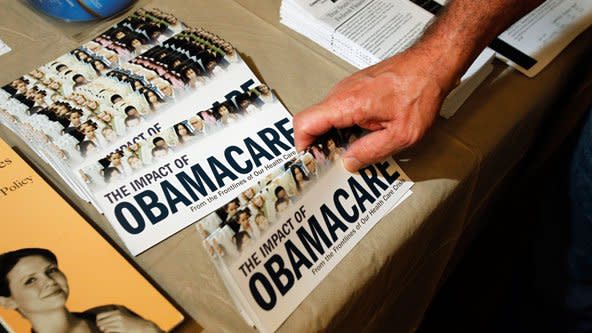Obamacare Could Go Back to the Supreme Court

It looks like the president’s health care law might be heading back to the Supreme Court, as two conflicting federal appeals court rulings today threw the fate of Obamacare back into question.
The issue this time is over subsidies provided to people who signed up for health coverage through the federal exchange. Four cases have challenged the law’s language, which states that subsidies would be available to “those enrolled through an exchange established by the State.” The plaintiffs in each case argue that the law does not permit people enrolled through the federal marketplace to receive subsidies.
Related: Court Challenges to Subsidies Threaten Obamacare
Today, two courts issued their rulings—both arriving at opposite conclusions—cementing the likelihood that the case ends up at the Supreme Court.
“There is a very good chance that this goes to the Supreme Court,” said Mark Rust, Managing Partner at Barnes & Thornburg, LLP in Chicago. He added that differing results in the circuit courts all but guarantees a Supreme Court case.
The first decision came early Tuesday morning from a three-judge panel within the U.S. Court of Appeals for the District of Columbia. The panel ruled 2-1 against the administration—saying people who buy insurance through the federally run exchange are not eligible for subsidies under the law. If that stands, it could potentially yank health care subsidies from nearly 5 million people who signed up for coverage through the federal exchange.
Obamacare critics and supporters alike cautioned that the panel’s ruling poses a huge threat to the stability of the health care law, which mandates that nearly everyone must have health coverage.
Related: Average Obamacare Subsidy- $3,312 Payout to Date $4.7 Billion
The administration estimates that of the more than 8 million people who signed up for coverage on the federal and state exchanges, 87 percent have qualified for subsidies. If people in the 36 states relying on the federal exchange aren’t allowed to get subsidies, they’ll likely see their monthly premiums skyrocket—potentially rendering their coverage unaffordable.
However, just hours later, the Fourth Circuit Court of Appeals offered its own decision on the ruling, which upholds the Obama administration's arguments that subsidies can be received by people who enrolled in either the state or federal marketplaces.
Now, experts say the Obama administration will likely appeal the opinion of the three-judge panel to the entire panel, which is made up of eight Democrats and three Republicans, Tom Christina of Ogletree Deakins, explained. If the panel hears the case, it is likely to side with the Administration and the three-panel opinion will be thrown out.
Related: Uninsured Face Cuts in Obamacare Subsidies
White House Press Secretary Josh Earnest told reporters on Tuesday that “the intent here is pretty clear and we feel pretty safe.”
Still, there are two other courts expected to issue rulings soon—in Indiana and Oklahoma--and unless all four courts side with the administration, the Supreme Court will likely take on the case.
“Given the importance of the subject matter, I suspect it would be a very good candidate to be heard by the Supreme Court,” Christina said.
Regardless, lawyers say the court decisions aren’t likely to prevent people from receiving subsidies in the fall—they expect that people who received subsidies on the federal exchanges will likely be able to continue doing so unless the Supreme Court strikes that down.
Related: Over $5 Billion and Counting for Obamacare Websites
If that happens, Rust said enormous pressure would be put on lawmakers whose constituents would be furious about losing their subsidies.
Meanwhile, health experts say that if the court’s decision stands, the pressure will be placed on governors of states who currently rely on the federal exchange.
“It will put the onus on governors to decide whether to set up insurance exchanges and make subsidies under the ACA available to their residents,” said Larry Levitt, Vice President of the Kaiser Family Foundation.
“This would create a similar dynamic that existed in Medicaid when the Supreme Court ruled that states had the option whether to expand the program or not. In Medicaid, though, states are ultimately on the hook for 10 percent of the cost. In the exchanges, the federal government covers 100 percent of the cost of the subsidies.
Top Reads from the Fiscal Times:

